Mahan Air Airline, Arrival at Tehran Airport
Day 1: Tehran
Meet and greet at the IKA airport with our professional tour guide then, transfer to the Hotel for brief refreshing then start the first day tour:
- Niavaran Palace
The complex traces its origin to a garden in the region of Niavaran, which was used as a summer residence by Fath-Ali Shah (1772-1834) of the Qajar Dynasty. During the reign of the Pahlavi Dynasty, a new palace named Niavaran was built for the imperial family of Mohammad Reza Shah (1919-1980).
- Reza Abbasi Museum
You may have heard of the paintings of the Aali qapu and Chehel sotoun Palace, this museum belongs to the creator of these works, and the greatest Persian Miniaturist of the Safavid Period. You can see the collections of 2nd millennium BC to the early 20th century which corresponds to the end of Qajar Period in this Museum.
- Zoroastrian Fire Temple (Adorian)
This fire-place was made with the financial help of Parsian in India and Iranian Zoroastrian. Outside of the building was made in the form of old Mansion but inside there is a simple room with a fire burning in it. This is the only fire temple in Tehran that is open to public Adrian Temple Complex, founded by Some Zoroastrians of India, consists of a few one-store buildings, and a community hall of two store.
- Nature Bridge
The Tabi'at Bridge or Nature Bridge, is the largest pedestrian overpass built in Tehran, Iran. The 270-metre bridge connects two public parks—Taleghani Park and Abo-Atash Park—by spanning Modarres Expressway, one of the main highways in northern Tehran.
O/N Tehran Day 2: Tehran-Hamedan
[3 h 40 min (319 km)] After Breakfast Drive to Hamedan, on the way visiting:
- Ali-Sadr Cave
Ali Sadr Cave was formed in Sariqieh Heights. Their distances from Ali Sadr Cave are 11 and 7 kilometers respectively. The caves are probably interlinked to Ali Sadr Cave in view of the extensive layers of crystallized calcareous in the region. Geologists believe that the rocks of this mountain pertain to the second geological period i.e. Jurassic (190-130 million years ago). Based on evidence within the cave, it was inhabited by primitive people.
- Lalejin
The small town of Lalejin celebrated its designation as the World Pottery Capital by the World Crafts Council in 2016. It is known as the center of pottery and ceramic productions in the Middle East. Lalejin, a city in the northwest of Iran’s Hamadan province.
- Lion Stone
The stone lion -one part of the 'Lions Gate'- sits on a hill where a Parthian era cemetery is said to have been located. When first built, this statue had a twin counterpart for which they both constituted the old gate of the city. During the Islamic conquest of Persia, the victorious Arabs referred to the gate as bâb ul-asad("the lions gate").
O/N Hamedan Day 3: Hamedan-Zanjan
[3 h 58 min (301km)] After Breakfast, sightseeing starts with Avicenna Tomb
- Avicenna Tomb
Avicenna is one of the renowned scientists and geniuses of Iran and the world. His most famous works are “The Book of Healing” and “The Canon of Medicine”, have been translated in several languages. This monument was built by the great architect, Hooshang Seyhoun. The construction of this monument was inspired by Gonbad-e Qabus (Qabus Dome), an architectural masterpiece in Islamic history of Iran.
- Ecbatana
Hagmatana, also called Tepe Hegmataneh (thought to correspond to the ancient citadel of Ecbatana) has a circumference of 1.4 kilometres with an area of about 40 hectares, which corresponds to a report from Polybius, although the ancient Greek and Roman accounts likely exaggerate Ecbatana's wealth, splendor, and extravagance. According to Herodotus, Ecbatana was chosen as the Medes' capital in the late 8th century BC by Deioces. Under the Achaemenid Persian kings, Ecbatana, situated at the foot of Mount Alvand, became a summer residence. Later, it became the capital of the Parthian kings.
- Dome of Soltaniyeh
It is one of the outstanding examples of the achievements of Persian architecture and a key monument in the development of its Islamic architecture. The construction process took about three years and more than 3000 workers did their best to create such an awesome masterpiece. The octagonal building is crowned with a 50 m tall dome covered in turquoise-blue faience and surrounded by eight slender minarets. It is the earliest existing example of the double-shelled dome in Iran.
O/N Zanjan Day 4: Zanjan-Tabriz
[3 h 15 min (307km)] After visiting some attractions on the way, the group will arrive Tabriz at the end.
- Zanjan Anthropological Museum
It is a traditional Qajar era laundry house and today it is Zanjan's Museum of Anthropology. This museum is located in the historical site of the beautiful edifice of the Rakhtshooy Khaneh in the renowned locality of Baba Jamal Charoqi of Zanjan. This is a remnant of the Qajar era and the museum displays fire exhibits related to the older times. Clothes or apparel that men and women wore, including handicrafts.
- Saltmen Museum
The Saltmen were discovered in the Chehrabad salt mines, located on the southern part of the Hamzehlu village, on the west side of the city of Zanjan, in the Zanjan Province. By 2010, the remains of six men had been discovered, most of them accidentally killed by the collapse of galleries in which they were working. After archaeological studies which included C14 dating of different samples of bones and textiles, the Salt Man was dated to about 1,700 years ago. By testing a sample of hair, the blood group B+ was determined.
- Kandovan
It is a village in Sahand Rural District, in the Central District of Osku County, East Azerbaijan Province, Iran. This village exemplifies manmade cliff dwellings which are still inhabited. The troglodyte homes, excavated inside volcanic rocks and tuffs similar to dwellings in the Turkish region of Cappadocia, are locally called "Karaan". Karaans were cut into the lahars of Mount Sahand. The cone form of the houses is the result of lahar flow consisting of porous round and angular pumice together with other volcanic particles that were positioned in a grey acidic matrix. After the eruption of Sahand these materials were naturally moved and formed the rocks of Kandovan.
O/N Tabriz Day 5: Tabriz
A full Day sightseeing starts with Blue Mosque
- Blue Mosque
Blue Mosque, as the most glorious edifice left from Kara Koyunlu era, was constructed by the order of Sultan Jahan Shah in 1465. The most remarkable features of this mosque are the especial blue tiles which are used in the exterior design, fascinating large dome and double-layered roof made of bricks and limestones. The tile work in harmony of colors along with delicate details and azure lines in the white background have made this mosque as a perfect example of Iranian architecture.
- Bazaar of Tabriz
The Bazaar of Tabriz (also Romanized as Bāzār-e Tabriz) is a historical market situated in the city center of Tabriz, Iran. It is one of the oldest bazaars in the Middle East and the largest covered bazaar in the world. It is one of Iran's UNESCO World Heritage Sites. Inside the Tabriz bazaar, the mozaffarieh is one of the best places in Iran to buy a carpet.
- El Goli
It is also known as Shah Gölü (Persian : شاه گلی, Azerbaijani: Şah Gölü) is the name of a large historic park containing an artificial lake in south east of Tabriz, Iran. Shah Gulu's artificial lake is a rectangular lake surrounded by four sidewalks and a stripe of flowers in its four sides.
O/N Tabriz Day 6: Tabriz-Baku
[7 h 24 min (552km)] The group will arrive Baku after visiting:
- Meshginshahr suspension bridge
It is crosses the Khiav River, near Meshginshahr, Ardabil Province in the northwest Iran. It is the Middle East's largest suspension bridge with a height of 80 metres (260 ft) and length of 365 metres (1,198 ft). The original bridge was built in 2015.
- Nizami & Torgovaya Street
It is a large pedestrian and shopping street in downtown Baku, Azerbaijan, named after classical poet Nizami Ganjavi. The street's history could be traced back to Baku's town-planning project of 1864. The street runs through the city's downtown from west to east. The traffic-free segment, which begins at the Fountains Square and ends at the Rashid Behbudov Street, is commonly known as Torgovaya ("the merchant street" in Russian).
O/N Baku 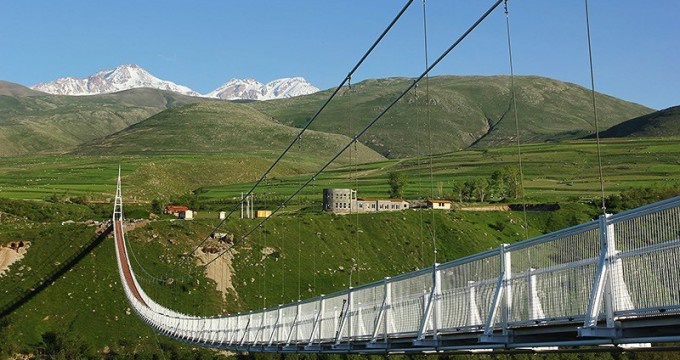 Meshginshahr suspension bridge
Meshginshahr suspension bridge 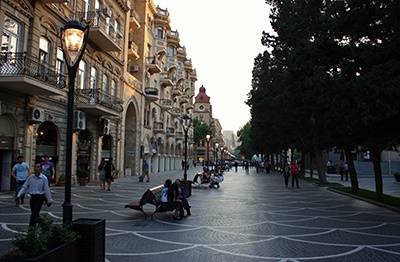 Nizami & Torgovaya Street
Nizami & Torgovaya StreetDay 7: Tabriz
A full Day sightseeing starts with Old City
- Old City
Or Inner City (Azerbaijani: İçərişəhər) is the historical core of Baku, the capital of Azerbaijan. The Old City is the most ancient part of Baku, which is surrounded by walls were well protected. In 2007, the Old City had a population of about 3000 people.
- Palace of Shirvanshahs
The Palace of the Shirvanshahs (Azerbaijani: Şirvanşahlar Sarayı) is a 15th-century palace built by the Shirvanshahs and described by UNESCO as "one of the pearls of Azerbaijan's architecture". It is located in the Inner City of Baku. In the past, the palace was surrounded by a wall with towers and, thus, served as the inner stronghold of the Baku fortress.
- Maiden Tower
(Azerbaijani: Qız qalası) is a 12th-century monument in the Old City, Baku, Azerbaijan. Along with the Shirvanshahs' Palace, dated to the 15th century, it forms a group of historic monuments listed in 2001 under the UNESCO World Heritage List of Historical Monuments as cultural property, Category III. It is one of Azerbaijan's most distinctive national emblems, and is thus featured on Azeri currency notes and official letterheads.
- Alley of Honor
The Alley of Honor (Azerbaijani: Fəxri Xiyaban, Honorary Alley) is a public cemetery and memorial in Baku, Azerbaijan. The Alley includes burials of famed Azerbaijanis and Azerbaijan-affiliated expatriates, including several Presidents, scientists and artists. There are 242 burials in total.
- Upland Park
Baku's Upland Park is the highest point in the Azerbaijani capital, opening a panoramic view of the city and its bay. The city's residents and visitors often come here to see a bird's eye view of Baku, and just have a walk.
O/N Baku Day 8: Baku-Sarein
[5 h 25 min (409km)] After Breakfast, We Will drive back to Iran North glorious attractions early in the morning
O/N Sareyn 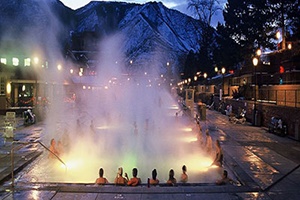 Sarein Spa
Sarein SpaDay 9: Sareyn-Anzali
[4 h 38 min (261km)] After Breakfast, Drive to Bandar Anzali, on the way visiting:
- Sheikh Safi oldin Ardabili
Shaykh Abu'l-Fath Ishaq, known as Safi al-Din Ardabili (b. 1252/3), is the eponymous founder of the Safawiyya order of Sufiism and is hence considered the founder of the Safavid Dynasty. The shrine was an important site of pilgrimage throughout the Safavid period (1501-1722) and underwent numerous improvements and embellishments to become one of the most beautiful of all Safavid monuments. The site includes a library, a mosque, a school, a mausoleum, a cistern, a hospital, kitchens, a bakery and some offices. The complex is a fine example of medieval Iranian architecture.
- Anzali Lagoon
Anzali Lagoon with an area of about 20 thousand hectares in the north of Iran is located in Gilan Province. Anzali Lagoon is one of the most interesting and greatest natural habitats of fauna in Iran and annually welcomes many birds that enter Iran from the neighboring countries. It is not comparable to any other lagoons in Iran due to its geographical position and in terms of its high humidity and water.
O/N Anzali 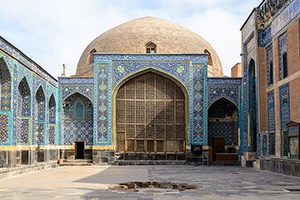 Sheikh Safi oldin Ardabili
Sheikh Safi oldin Ardabili 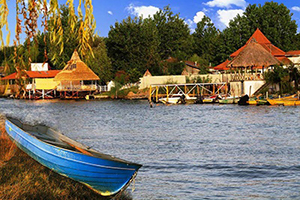 Anzali Lagoon
Anzali LagoonDay 10: Anzali-IKA
[5 h 16 min (398km)] The group will transfer early in the morning to IKA Airport to fly back home, on the way visiting:
- Museum of Rural Heritage
The Guilan Rural Heritage Museum as an open-air museum which is devoted to the rural and ancestral life, is the first one in Iran and remains so far, the unique museum of this type in Iran and beyond in the Middle-East and the Central Asia. This Museum was designed to preserve and revive the material and spiritual heritage of GUILAN, a coastal region of the Caspian Sea in the North-West of Iran.
- Aminiha Hosseiniyeh
It is a historic Hosseiniyeh in the Akhund (Molavi) neighborhood of Qazvin. Behind an unassuming brick wall is this well-preserved Qajar mansion built by a rich merchant in 1773. The courtyard garden is a pleasant place to linger after being dazzled by the mirrored, glittery interior, with its colored glass windows and vaulted basement.
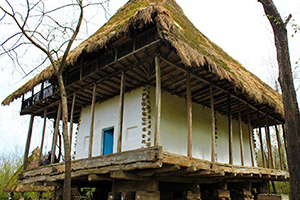 Museum of Rural Heritage
Museum of Rural Heritage 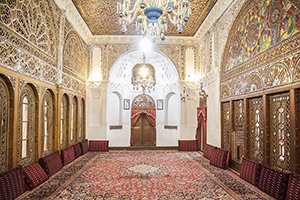 Aminiha Hosseiniyeh
Aminiha HosseiniyehGuide Map
- Tehran
Tehran Province, Iran
- Hamedan
Hamedan Province, Iran
- Zanjan
Zanjan Province, Iran
- Tabriz
East Azerbaijan Province, Iran
- Baku
Baku, Azarbaijan Republic
- Sarein
Ardabil Province, Iran
- Bandar Anzali
Gilan Province, Iran
- Imam Khomeini International Airport
ACCOMODATION | CITY | HOTELS | NIGHT |
| Tehran | Esteghlal West Tower or other 4* Hotel | 1 |
| Hamedan | Katibeh or other 4* Hotel | 1 |
| Zanjan | Bozorg Hotel 4* | 1 |
| Tabriz | Tabriz or other 4* Hotel | 2 |
| Baku | Staybridge Suit or other 4* Hotel | 2 |
| Sareyn | Laleh Hotel 4* | 1 |
| Anzali | Sefidkenar Hotel 4* | 1 |